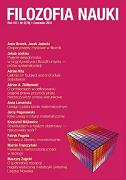O problemach w definiowaniu pojęcia prawa przyrody przez nierzeczywiste okresy warunkowe
Problems with Defining the Notion of Law of Nature in Terms of Counterfactual Propositions
Author(s): Adrian A. ZiółkowskiSubject(s): Philosophy
Published by: Uniwersytet Warszawski - Wydział Filozofii i Socjologii, Instytut Filozofii
Keywords: laws of nature; counterfactuals; inferential semantics; possibile-world semantics
Summary/Abstract: The article is a critical commentary on explication of the notion of law of nature based on the concept of counterfactual proposition. The view in question was originally proposed in the 40’s of past century by Roderick M. Chisholm and Nelson Goodman (further referred to as ‘CG criterion’) and has been popular among philosophers ever since. The main thesis that I argue for is that jointly with the most crucial philosophical analyses of counterfactuals — including inferential semantics proposed by Chisholm and Goodman themselves and possible-world semantics introduced by David Lewis — the aforementioned method of explaining laws of nature generates circulus in definiendo. Firstly I focus on the main issues of providing an adequate philosophical account of laws of nature. One of those issues is a need of drawing a distinction between socalled accidental and non-accidental generalizations, which CG criterion is supposed to provide. In short, according to CG criterion, laws of nature are those and only those true generalizations which support the truth of analogous counterfactual propositions. Then I move on to present Chisholm and Goodman’s account of counterfactuals. According to their analysis the truth of a given counterfactual is equated with the existence of a deductive system that allows to infer the consequent of the counterfactual in question on the basis of the assumption of its antecedent. I discuss some technical (mainly logical) problems with their solutions. Then, I reveal that in order to make it work, the solution in question requires the use of the notion of law of nature and thus leads to circularity. Finally, I consider whether GC criterion might be proposed jointly with the most popular truth-conditional semantics for counterfactuals introduced by D. Lewis without causing such problems as mentioned above. By pointing out the fact that similarity between possible worlds is crucial for Lewis’ analysis of counterfactuals and that correspondence in respect of laws is the most important criterion of similarity between worlds I show that GC criterion leads to circularity in this case as well.
Journal: Filozofia Nauki
- Issue Year: 20/2012
- Issue No: 2 (78)
- Page Range: 67-93
- Page Count: 27
- Language: Polish

